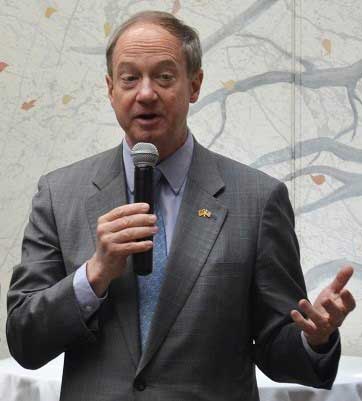
US Ambassador to Germany John Emerson
Henry Kissinger famously used to say "when I want to call Europe, whom do I call?" Now, said US Ambassador to Germany John Emerson, "We have the answer to that question - and it is Angela Merkel." Emerson, who has been on post in Berlin since August 2013, says that Germany under Merkel has clearly emerged as the leader of Europe, even though many Germans are "very nervous" about occupying that position, for historical reasons. Speaking to a LAWAC Roundtable lunch on Wednesday, June 8th, Emerson reeled off a list of issues, from economics to security to refugee policy to climate change to coordinating sanctions against Russia after the Crimean annexation to the fight against Ebola: in each area Emerson said that Germany has been the key partner in Europe for the US.
There have been challenges - one month after he arrived in Germany it was revealed that the NSA had been tapping Merkel's cell phone, which didn't play well in a country which is highly sensitive to issues of state surveillance. But Emerson has consistently told Germans that while the cell phone tapping was a mistake, "we shouldn't throw out the baby with the bathwater", and US-German intelligence sharing was crucial in the fight against ISIS and terrorist networks inside Europe.
On a personal level Emerson said Merkel "is very impressive - she calls herself the "Queen of Austerity" but she has a bright smile and is personally very engaging. She is tough, but has a soft side which is very appealing, and she has an infinite amount of charm."
Politically, Merkel continues to enjoy high levels of support, even though her popularity suffered because of her decision to allow immigrants unlimited access to Germany for much of last year. In 2015 Germany "admitted 1.2 million refugees into a country the size of Montana" - a decision that caused considerable grumbling within her own party and a rise in anti-immigrant demonstrations in the streets. The refugee policy was a departure from Merkel's normal process, which Emerson said is often described as "leading from behind - she gets a sense of where the public is and then goes there herself - she is very pragmatic - don't forget she was a scientist." But with refugees fleeing for Europe from the Middle East, Merkel suddenly "went against type - she made an instinctual, gut-level decision reacting to a humanitarian crisis happening on her borders." Partly this was because she herself was a quasi-refugee, growing up in East Germany, and partly, said Emerson, it was because Germany "was a country that had talked about master genes and detainment camps... and she saw this as a way of creating a new narrative for Germany."
Merkel paid a political price for this as the refugees kept coming, and now she has forced through an agreement with Turkey to take back many of the new migrants headed north. However Emerson said politically his judgment is that she has survived, partly because all the four parties in her coalition support her policies, and partly because she has no obvious successor. "She has done a good job cutting off the legs of anyone who could challenge her." Emerson said she will likely run again for a fourth term in next year's elections, and is likely to win.
The other big challenge Merkel has had to confront is Russia's invasion of Ukraine and its attempts to intimidate Europe. Merkel has been the one to personally confront Putin - "we call her the 'Putin Whisperer'" said Emerson. She speaks very good Russian, once winning an award for her Russian language skills in East Germany, and Putin also speaks German having been posted to Dresden for the KGB. When they meet they switch between languages, and if they have interpreters for official discussions they often correct the interpreters in mid-sentence. But despite their linguistic fit, "Merkel is very frustrated with Putin - he has lied to her face on several occasions," said Emerson. In addition to Russia's overt military threat with its "little green men" in Ukraine, Moscow is also spending hundreds of millions of dollars into a very effective propaganda campaign throughout Europe, justifying its Ukraine policy and trying to undermine the trade talks between the US and the EU. "This is not your father's era propaganda - this is very sophisticated." In the end, there is nothing that Putin would like more than to drive a wedge between the US and Europe.
Which is why the job of US Ambassador to Germany has been such a busy assignment.
